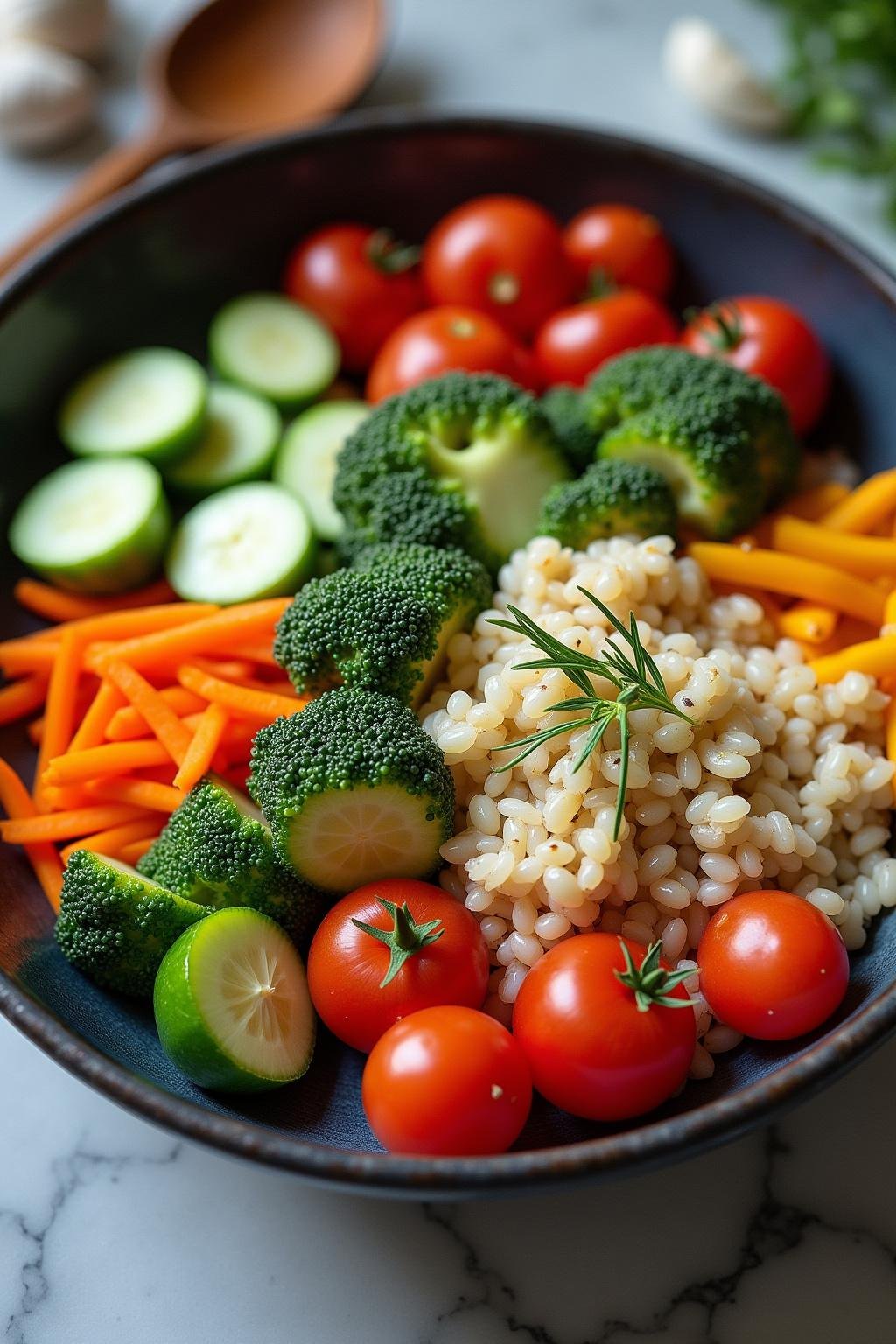1. Introduction
Maintaining a healthy gut is fundamental to overall wellness, influencing everything from immune function to mental health. Incorporating a variety of gut-friendly recipes into your weekly meal plan is one of the most effective strategies to support digestive wellness. These recipes focus on promoting healthy digestion by prioritizing probiotic foods, prebiotic meals, high-fiber ingredients, and anti-inflammatory components. In this comprehensive guide, you’ll discover 10 essential gut-friendly recipes that you’ll want to prepare every week, helping you achieve optimal gut health naturally, deliciously, and sustainably.
2. Why Are Gut-Friendly Recipes Crucial for Digestive Wellness?
Gut-friendly recipes are crafted with ingredients that nourish your microbiome, such as probiotics, prebiotics, and fiber-rich foods that promote balanced gut bacteria. Incorporating these foods can improve nutrient absorption, reduce bloating, and alleviate discomfort. As part of a fiber-rich diet, they contribute to better immune function, enhanced mood, and increased energy levels. These recipes serve as essential tools for supporting digestive wellness and maintaining a healthy microbiome.

3. Top 10 Gut-Friendly Recipes for Weekly Digestive Wellness
Achieving a fiber-rich diet that enhances gut health involves including probiotic foods, prebiotic meals, and anti-inflammatory ingredients in your daily routine. These recipes are designed to stimulate beneficial gut bacteria, combat inflammation, and improve digestion. Here are ten flavorful, easy-to-make gut-friendly recipes that should become staples in your culinary repertoire for digestive wellness.
1. Fermented Vegetable Kimchi
Kimchi, a traditional fermented Korean dish, is a powerhouse of probiotics supporting healthy gut bacteria. Its spicy, tangy profile makes it perfect for salads, rice bowls, or as a side. Regularly consuming kimchi can enhance your body’s ability to digest and absorb nutrients effectively while reducing inflammation—an essential element of a fiber-rich diet that promotes digestive wellness. To elevate your probiotic intake, consider adding fermented foods like kimchi alongside other valuable products, such as a high-quality probiotic supplement, which you can find here.
2. Greek Yogurt Parfait with Berries and Seeds
This probiotic-rich snack combines creamy Greek yogurt with the antioxidant power of berries and the fiber density of seeds. It’s an excellent way to introduce beneficial bacteria into your gut while supporting a fiber-rich diet for improved digestion. To take this to the next level, include a nutrient boost with a gut healing tea, such as Traditional Chinas Contrast Tea, which supports digestive function. Furthermore, for enhanced gut health, exploring a comprehensive gut-friendly foods book may provide additional insights into delicious probiotic recipes.
3. Prebiotic Oatmeal with Bananas and Chia Seeds
Oatmeal is a fantastic source of prebiotics that fuel your gut’s beneficial bacteria. Topping your oats with ripe bananas and chia seeds further increases fiber content, fostering a healthy, restful digestion and reducing bloating. For an extra layer of digestive support, consider adding a few drops of an anti-inflammatory turmeric smoothie during your breakfast routine, which you can craft for yourself or explore in a dedicated gut-friendly smoothie recipe eBook. Maintaining a consistent intake of prebiotic meals ensures your microbiome stays diverse and resilient.
4. Miso Soup with Seaweed and Tofu
This soothing soup combines fermented miso paste, nutrient-dense seaweed, and protein-rich tofu. It’s packed with probiotics and antioxidants that help lower inflammation and promote digestive wellness. Incorporate this comforting dish into your diet regularly, complemented by a herbal gut healing tea like Traditional Chinas Contrast Tea, to facilitate digestion and reduce bloating.
5. Sauerkraut and Whole Grain Sandwich
Adding fermented sauerkraut on a hearty whole grain bread creates a simple yet powerful gut-friendly recipe. This combination supplies a natural source of probiotics along with fiber, essential for microbi hit stability and efficient digestion. For optimal gut health, incorporating a variety of fermented foods along with probiotic supplements—available here—can boost your microbiome diversity and digestive function.
6. Anti-Inflammatory Turmeric Smoothie
This vibrant smoothie harnesses turmeric, ginger, and leafy greens—all known for their potent anti-inflammatory properties that soothe and heal the gut. Blending these into your daily routine supports digestive wellness and reduces discomfort. To deepen your anti-inflammatory strategy, consider enjoying a calming Gut Healing Tea that complements your dietary efforts.
7. Lentil and Vegetable Stir-Fry
Lentils, packed with fiber and plant-based protein, are ideal for a fiber-rich diet. Stir-fried with colorful vegetables, they make a gut-friendly recipe that preserves digestive health and encourages regular bowel movements. For additional digestive support, incorporating fermented foods or probiotic supplements can enhance the benefits of this dish.
8. Kefir and Fruit Breakfast Bowl
Kefir is a potent probiotic drink that improves gut flora diversity. Paired with fresh fruit, it becomes an easy and tasty breakfast that promotes digestion and boosts overall wellness. To further support your microbiome, consider supplementing your diet with probiotic capsules, available here.
9. Tempeh Salad with Nuts and Vegetables
Tempeh, a fermented soy product, is rich in probiotics and ideal for a nourishing prebiotic meal. Tossed with crunchy nuts and fresh vegetables, this dish supports a healthy microbiome and boosts immune function. Combining fermented foods with nuts and fresh produce can be an excellent step toward a fiber-rich diet that promotes digestive health. To deepen your understanding, exploring a raw food diet book like here can be beneficial.
10. Baked Sweet Potatoes with Cabbage Slaw
This comforting dish combines nutrient-dowering fiber-rich sweet potatoes with crunchy cabbage slaw. Both ingredients are excellent sources of prebiotics, fostering digestive wellness and microbiome support. To enrich your journey of digestive wellness, consider joining a holistic gut retreat, like the ones found here.
4. Tips for Seamlessly Incorporating Gut-Friendly Recipes into Your Daily Routine
- Begin with small portions of fermented foods such as kimchi or sauerkraut and gradually increase your intake to allow your gut to adapt safely.
- Experiment with different probiotic and prebiotic ingredients to promote microbiome diversity, which is pivotal for digestive wellness.
- Choose whole, minimally processed ingredients to maximize nutrient absorption and improve overall gut health.
- Balance your meals with healthy fats, fibers, and herbs like turmeric and ginger, known for their anti-inflammatory benefits.
- Maintain consistency and listen to your body’s responses, adjusting intake as needed to optimize digestive wellness.
5. Conclusion
Enhancing your gut health through delicious, gut-friendly recipes is a natural, enjoyable approach to improved digestion, reduced inflammation, and enhanced overall wellbeing. By regularly including these 10 nutrient-dense and probiotic-rich dishes, you support a thriving microbiome and optimal digestive wellness. Make these flavorful recipes a cornerstone of your weekly meal plan and witness your gut flourish!
6. FAQs About Gut-Friendly Recipes
What are some easy gut-friendly recipes to start with?
Begin with straightforward options like Greek yogurt parfaits, sauerkraut sandwiches, or overnight oats topped with bananas and chia seeds. These recipes are quick, simple, and effectively boost your digestive wellness.
Can I daily include fermented foods?
Absolutely. Incorporating small amounts of fermented foods like kimchi, sauerkraut, or kefir daily can gradually build a robust gut microbiome. For comprehensive support, consider adding a high-quality probiotic supplement; you can find great options here.
Are there foods to avoid for a healthier gut?
Limit processed foods, excessive sugar, and artificial additives that can upset your microbiome, cause inflammation, and lead to bloating. Instead, focus on organic, whole foods to support digestive wellness.
How long before I see improvements in my gut health?
Many people experience positive changes within a few weeks of consistently incorporating gut-friendly recipes. Individual results can vary based on microbiome diversity and overall lifestyle.


2 thoughts on “10 Gut-Friendly Recipes You’ll Want Every Week”